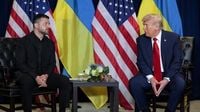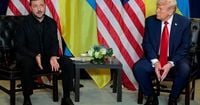In a striking reversal that has sent ripples across diplomatic circles, United States President Donald Trump declared on September 23, 2025, that Ukraine—with the backing of the European Union and NATO—could reclaim all territory seized by Russia since the full-scale invasion began more than three years ago. This new position, broadcast in a lengthy Truth Social post following his meeting with Ukrainian President Volodymyr Zelenskyy at the United Nations General Assembly in New York, marks a dramatic departure from Trump’s earlier insistence that both sides would need to swap land to secure peace.
“With time, patience, and the financial support of Europe and, in particular, NATO, the original Borders from where this War started, is very much an option,” Trump wrote, according to Al Jazeera. He did not clarify whether his vision for Ukraine’s “original borders” included Crimea, which Russia annexed in 2014, but the statement was unequivocal in its optimism for a full Ukrainian restoration.
The president’s message was laced with pointed criticism of Moscow’s military campaign. “Russia has been fighting aimlessly for three and a half years a War that should have taken a Real Military Power less than a week to win. This is not distinguishing Russia,” Trump wrote. He went further, calling Russia a “paper tiger” and stating, “Putin and Russia are in BIG Economic trouble, and this is the time for Ukraine to act.”
Trump’s meeting with Zelenskyy—about an hour in duration and held on the sidelines of the UN gathering—was by all accounts cordial, a notable improvement from their sometimes rocky relationship. Earlier this year, the pair had clashed publicly in the Oval Office, with Trump telling the Ukrainian leader, “you don’t have the cards” for a favorable outcome. But on Tuesday, Trump expressed “great respect for the fight that Ukraine is putting up. It’s pretty amazing actually.”
The shift did not go unnoticed. Zelenskyy, speaking to reporters and to Fox News’ Bret Baier, admitted he was “a little bit” surprised by Trump’s about-face. “I think he understands for today that we can’t just swap territories. It’s not fair,” Zelenskyy said, emphasizing that any deal requiring Ukraine to cede land would be “unfair and unconstitutional.” He added that Trump’s new position was “a big shift. Very positive.”
According to NBC News, the White House did not immediately announce any concrete changes in policy or new sanctions against Russia in response to Trump’s remarks. Still, the tone from the top had clearly changed. Trump’s statement, according to a senior administration official, was intended to exert “maximum public pressure on Russia to get them to the table for a deal” to end the war. The next steps, the official said, would depend on Moscow’s reaction.
International reaction was swift and largely supportive, especially among European allies who have long advocated for a tougher line against Russia. French President Emmanuel Macron, who also met with Trump on Tuesday, praised the statement, saying, “I think it’s a very, very right one.” Macron added, “If we back completely Ukraine in this situation, given the Russian economy is suffering, I mean, there is this opportunity of a good future.”
Senator Lindsey Graham, a Republican member of the Appropriations Committee, called Trump’s apparent policy change “a gamechanger” on X (formerly Twitter). “This commitment to continue to sell high end American weapons to NATO for the benefit of Ukraine tremendously changes the military equation for Russia,” Graham wrote, adding that Russia’s economic woes would only worsen if the West made buying Russian oil and gas “toxic.”
Mykola Murskyj, director of advocacy for the group Razom for Ukraine, was even more effusive, saying Trump’s comments reflected “the kind of leadership that wins Nobel Peace Prizes.” He added, “Putin only respects strength, and that’s exactly what we saw from President Trump today.”
Despite the encouraging words, the situation on the ground remains dire. Russia currently occupies nearly 20 percent of Ukrainian territory, including swaths of eastern Ukraine and Crimea. The Kremlin has demanded that Ukraine cede these lands and forswear NATO membership as conditions for ending the war—terms Kyiv and its Western backers have flatly rejected.
Trump’s own stance on NATO and European support has evolved. Early in his administration, he ruled out NATO membership for Ukraine and urged European leaders to shoulder more of the military burden. Now, he has committed to continuing the sale of high-end American weapons to NATO for Ukraine’s benefit, a move that, according to Graham, “tremendously changes the military equation for Russia.”
Trump has also pressed NATO allies to halt purchases of Russian oil and to impose steep tariffs on China, which has maintained close ties with Moscow despite Western sanctions. “Those moves could be of great help in ENDING this deadly, but RIDICULOUS, WAR,” Trump wrote earlier this month.
The security situation in Eastern Europe remains tense. On September 19, NATO scrambled jets after three Russian MiG-31 fighters breached Estonian airspace for 12 minutes, prompting Estonia to call for a UN Security Council meeting and urgent talks with NATO allies. Poland, too, reported repeated Russian drone incursions into its airspace, describing them as “acts of aggression.” NATO responded with a stern warning to Moscow, vowing to use “all necessary military and nonmilitary tools” to defend itself and condemning what it called “a pattern of increasingly irresponsible behaviour.”
Asked at the UN whether NATO countries should shoot down Russian aircraft that violate their airspace, Trump was unequivocal: “Yes, I do.” However, when pressed on whether he still considered Putin a reliable negotiating partner, Trump was noncommittal: “I’ll let you know in about a month from now, OK?” he told reporters.
For Ukraine, the stakes could hardly be higher. Zelenskyy has repeatedly called for increased international pressure on Russia, including secondary sanctions, and for robust security guarantees to deter future aggression if the current conflict ends. During his Fox News interview, Zelenskyy said he and Trump had discussed intensifying pressure “directly on Putin” and on Russia’s energy network and financial systems, expressing hope for further U.S. sanctions.
Despite some ambiguity about the specifics of Trump’s plan—particularly whether Crimea is included—his public support for Ukraine’s full territorial integrity has shifted the diplomatic landscape. Western officials and allies, while cautious about reading too much into presidential rhetoric, welcomed the new tone. As one Western official told NBC News, “We have always been saying that Russia has been weaker than anyone thought... We fully agree with this analysis.”
While Trump’s statement may not immediately alter U.S. policy or military aid, it has injected fresh optimism into Ukraine’s fight and reenergized calls for a united Western front. Whether this will translate into tangible changes on the battlefield or at the negotiating table remains to be seen. But for now, the message from Washington is clear: the days of suggesting Ukraine must give up land to secure peace may finally be over.


